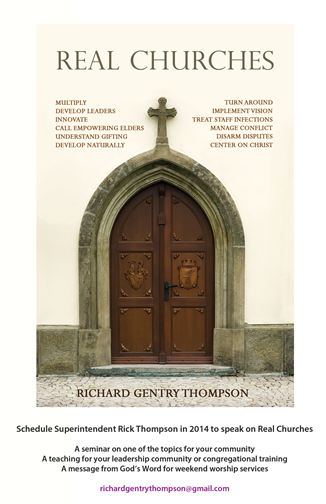It is a privilege to feature my interview with Dr. Rick Thompson. Drawing from his decades of ministry leadership, Rick’s recent book, Real Churches, is full of wisdom and insight into the tangible steps that leaders can take toward realizing more authentic community and effective gospel witness.
Rick, why did you write Real Churches?
I teach the Introduction to American Church Planting course at Trinity Evangelical Divinity School in Deerfield, Illinois. Our core textbook on the theology of the church is Timothy Keller’s Center Church. Real Churches focuses on practical issues that churches face everyday like how to develop leaders, how to multiply ministries, how to deal with a “staff” infection, and how to develop and cast vision. This book is not about one success story from one church. It comes from various churches, of which I serve as a superintendent; Real Churches seeks to bring together stories from the grass roots and insights from Scripture for the hard issues that churches encounter.
Rick, one hot topic is developing leaders. What is your basic approach?
Some churches are so discouraged in developing leaders that they will select anyone. If you can put on a video, you can be a small group leader. If you come to church every Sunday, you can be a Sunday school teacher. If you put significant money in the offering plate, you are on the church board. It is a sign of disorder when children are not allowed to develop, but are thrust into leadership.
I will make boys their officials;
mere children will govern them.
People will oppress each other—
man against man, neighbor against neighbor.
The young will rise up against the old,
the base against the honorable (Isaiah 3:4-5).
As we study the Scriptures for a biblical understanding of leadership development, I see four distinct stages—learners, laborers, leaders, and elders. I also give four corresponding skills needed to develop people at each stage.
Rick, what do you have to add to vision casting in the church?
One pastor said that if he hears the word “vision” again he is going to “puke.” Yet he is an effective leader and he does have clear vision for the church he serves. Without vision, a growing church will never move past a plateau. Without vision, a new church will never be planted. Without vision, decline is the next chapter.
One of my mentors, Ben Sawatsky, former executive director of a missionary organization, defined vision as “insight into God’s purposes.” Heavenly vision is not just our idea; it is God’s invitation to join him in his work. We do not come up with heavenly vision. We obey. “I was not disobedient to the vision from heaven” (Paul in Acts 26:19). Within the heavenly vision, we need to understand two aspects: the “core vision” and the “concrete vision.”
- Core vision is the view of the mountain range of the Promised Land.
- Concrete vision is seeing the next hills to climb to get to the Promised Land.
- Core vision launches the organization and is fixed to stay the course.
- Concrete vision keeps us ascending and has flexible mid-course corrections.
Here is my definition that the book develops. Vision is insight into God’s purposes revealed to God’s leader, confirmed by authorities, shared by the team, in alignment and attunement, implemented with managerial skills unto Christlikeness.
Rick, you write about a painful problem in some churches-a staff infection. What is that?
Senior pastors who have experienced a “staff” infection give the same testimony. Everything else in the church might be healthy, but if there is a staff infection, the senior pastor is miserable every day. The Bible calls him Diotrephes.
I wrote to the church, but Diotrephes, who loves to be first,… (3 John 9)
Every healthy church has a plurality of elders and a lead pastor who is the “first among equals” who works as a servant leader of the team. A Diotrephes does not believe in a “first among equals.” He loves to be first, period. He might be the lead pastor who develops a dangerous dictatorship. This leader is self-willed. “My way is Yahweh.” He loves the power and he will use it to accomplish his purposes because he believes that he is doing the will of God from the first chair.
The staff infection can be in someone other than the overseer. I have seen elders try to usurp authority that the constitution does not grant because they believe they need to steer the ship. I have seen executive pastors decide that the senior pastor needs to go, work to convince the elders that a change is needed, and try to position themselves to be the new lead pastor of the church. Any staff person can become infected with “the love to be first” and bring a staff infection into the church. John gives us insights in his third letter on how to deal with Diotrephes.
Rick, you have a section on the Shepherd Search.
The search for a new shepherd, elder, and overseer is an opportunity to experience God in a new and fresh way. Shepherds do not magically appear from websites or search firms. The local church needs a careful process saturated with prayer that leads to the selection of a new pastor. Here is a healthy, proven process of searching for the next pastor of a local church.
Prayer
Preparation
Profile
Pool of Resumes
Preaching
Personal Behavioral Interview
Pastoral Candidate
If you are interested a church consultation in any of these areas you can contact: richardgentrythompson@gmail.com





